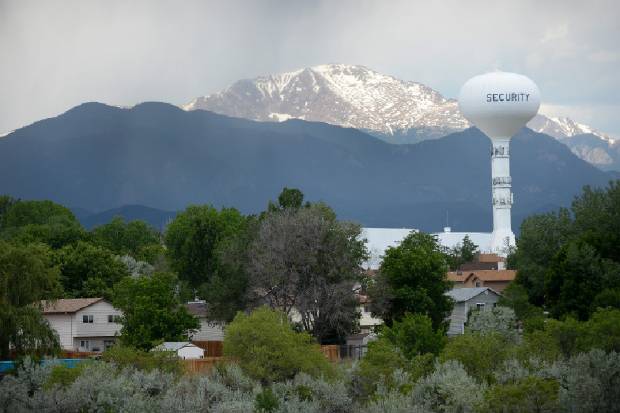A Colorado Springs law firm filed the second lawsuit this week targeting the manufacturers of a firefighting foam believed to have contaminated drinking water in Security, Widefield and Fountain.
McDivitt Law Firm capped a monthlong campaign to woo clients by filing a federal lawsuit Thursday seeking class-action status on behalf of thousands of people whose tap water comes from the fouled Widefield aquifer.
The case largely mirrors another federal class-action lawsuit filed earlier this week by a Denver law firm targeting 3M, Ansul Foam of Wisconsin and National Foam of Pennsylvania.
McDivitt’s suit also named those companies as defendants, but it added three more: Chemguard of Wisconsin, as well as Angus Fire and Buckeye Fire Equipment Co., which have offices in North Carolina.
The latest suit alleges those companies knew, or should have known, the dangers of a firefighting foam used for years at Peterson Air Force Base, the Colorado Springs Airport and Fort Carson. And it claims the companies opted to profit from the foam, rather than warn the military or residents of its dangers.
The pattern repeated itself for years, the suit alleges, all while the toxic chemicals pooled in the blood of residents living downstream.
All nine plaintiffs have elevated blood levels of perfluorinated compounds – the key ingredient in the military’s firefighting foam. The chemicals have been associated with a host of ailments, including kidney and testicular cancers and thyroid disease.
“They are worried to death,” said Mike McDivitt, the firm’s founder. “They’re carting water in to use – they still are.”
McDivitt said about 1,000 people have retained his firm, and many more residents have expressed interest. His firm is partnering with a New York firm, Napoli Shkolnik PLLC, which specializes in environmental law cases.
The residents want the companies to establish a medical monitoring program to help detect and better treat diseases that might be caused by the chemicals. The suit also seeks punitive damages, as well as a testing program for water across the Fountain watershed.
Most companies did not return after-hours calls or emails from The Gazette seeking comment. An Ansul Foam representative said the company does not comment on ongoing litigation.
A 3M representative said he had not seen the latest lawsuit Thursday evening. However, a previous statement by a 3M attorney said 3M would “vigorously” defend itself against the lawsuit filed earlier this week – adding that the foam saves lives and that the earlier claims “lacked merit.”
Law experts who study class-action lawsuits, however, said the plaintiffs in the Pikes Peak region are a long way from any possible payday.
The most difficult struggle may be proving a simple point: that the contaminated well water caused them harm worthy of a court award, said Tom Metzloff, a professor at North Carolina’s Duke Law School who studies class-action lawsuits.
“One of the biggest problems that comes up right away is causation,” he said. “These cases are often significantly fought over by experts.”
Metzloff said the chemical manufacturers have a series of defenses they can use, including a possible use of the “military contractor defense.”
That shields manufacturers from liability for products built under government contract, and could cover the firefighting foam, which was built to a military specification that’s patented by the Navy.
One of its first legal hurdles is whether the plaintiffs south of Colorado Springs can sue as a group or as individuals.
Both lawsuits have sought class-action status, which calls for a handful of people to represent a large group of residents affected by the same problem and living in the same area. A judge must approve that type of status for the cases to proceed.
Federal judges routinely combine similar class-action suits filed by different law firms when they involve the same general area and complaints, said David Marcus, a University of Arizona law professor who specializes in class-action cases. In that case, a judge would appoint attorneys for the group.
It’s also possible the Colorado cases will be argued outside of the state, Metzloff said. That’s because several similar cases over foam contamination have been filed around the country. All of them might land before a multi-district federal court panel, which could combine them into a single case to be heard by a single judge.
“There’s real potential this could be sent to multi-district litigation,” Metzloff said.
Contact Jakob Rodgers: 476-1654
Please visit the source link below to read the entire article.
Source: gazette.com




